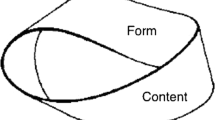Abstract
I introduce the two principal concepts of this special issue through a discussion of some of the main roles place and time play in argumentation and some of the meanings involved in those roles. Some of the definitions of kairos are explored leading to suggestions for how this concept and that of ‘place’ can operate in argumentation.
Similar content being viewed by others
Notes
Silence as an argumentative strategy has a number of interesting forms. Jianfeng Wang, in his paper in this collection, draws attention to how Willy Brandt employs it. See also Glenn (2004).
I employ the C. J. Rowe translation (Plato 1986) from Oxford, Aris & Phillips Classical Texts.
Available at https://www.youtube.com/watch?v=zrp-v2tHaDo.
I am grateful to Stephen Pender for drawing my attention to the relevance of Ginzburg's work in this respect.
And here, at the very end, I deign to define the key term of the chapter. But, arguably, this definition required the explorations of the chapter to give it force.
References
Aristotle, and George A. Kennedy. 2007. On rhetoric: A theory of civic discourse (Trans.). Oxford: Oxford University Press.
Burke, Kenneth. 1969/1955. A grammar of motives. Berkeley, CA: University of California Press.
Clendinnen, Inga. 2005. Dancing with strangers: The true history of the meeting of the British first fleet and the Aboriginal Australians 1788. Edinburgh: Canongate Books Ltd.
Fogelin, Robert. 1985. On deep disagreements. Informal Logic 7: 1–8.
Geertz, Clifford. 1973. Thick description: Towards an interpretative theory of culture. In The interpretation of cultures: Selected essays, ed. Clifford Geertz, 3–130. New York: Basic Books.
Geertz, Clifford. 1983. Local knowledge: Further essays in interpretative anthropology. New York: Basic Books.
Geertz, Clifford. 2000. Available light: Anthropological reflections on philosophical topics. Oxford: Oxford University Press.
Ginzburg, Carlo. 1986. In Myths emblems clues, ed. J. Tedeschi and A. Tedeschi. London: Hutchinson Radius.
Ginzburg, Carlo. 1999. History, rhetoric, and proof. Hanover: The University Press of New England.
Glenn, Cheryl. 2004. Unspoken: A rhetoric of silence. Carbondale, IL: Southern Illinois University Press.
Healy, Chris. 1997. From the ruins of colonialism: History as social memory. Cambridge: Cambridge University Press.
Kinneavy, James L. 1994. Kairos: A neglected concept in classical rhetoric. In Landmark essays on rhetorical invention in writing, ed. Richard E. Young and Yameng Liu. Davis, CA: Hermagoras Press.
Kinneavy, James L. 2002. Kairos in classical and modern rhetorical theory. In Rhetoric and kairos: Essays in history, theory, and praxis, ed. Phillip Sipora and James S. Baumlin, 58–76. New York: SUNY.
Lanham, Richard A. 1991. A handlist of rhetorical terms (1stedition 1969), 2nd ed. Berkeley, CA: University of California Press.
Leff, Michael C. 2016. Rethinking rhetorical theory, criticism, and pedagogy. In East Lansing, ed. A. de Velasco, J.Angus Campbell, and D. Henry. Michigan, MI: Michigan State Press.
McGeough, Ryan E., Catherine H. Palczewski, and Randall A. Lake. 2015. Oppositional memory practices: U.S. memorial spaces as arguments over public memory. Argumentation and Advocacy 51 (4): 231–254.
Nagel, Thomas. 1986. The view from nowhere. Oxford: Oxford University Press.
Perelman, Chaim. 1989. The new rhetoric and the rhetoricians: Remembrance and response. In The new rhetoric of Chaim Perelman: Statement and response, ed. R. Dearin, 239–251. Lanham, MD: University Press of America.
Perelman, Chaim, and Lucie Olbrechts-Tyteca. 1969. In The new rhetoric: A treatise on argumentation, ed. J. Wilkinson and P. Weaver. Notre Dame, IN: University of Notre dame Press.
Plato, 1986. In Phaedrus (Trans.), ed. C.J. Rowe. Oxford: Aris & Phillips Classical Texts.
Richards, Ivor A. 1936. The philosophy of rhetoric. Oxford: Oxford University Press.
Sipora, Phillip. 2002. Introduction: The ancient concept of Kairos. In Rhetoric and kairos: Essays in history, theory, and praxis, ed. Phillip Sipora and James S. Baumlin, 1–22. New York: SUNY.
Stanner, William E.H. 1990. The dreaming. In Traditional Aboriginal society, ed. William Edwards, 225–236. South Melbourne: McMillan Company. (Originally published in 1956).
Thompson, Roger. 2000. Kairos revisited: An interview with James Kinneavy. Rhetoric Review 19 (1/2 (Autumn)): 73–88.
Ward, Stephen J. 2004. The invention of journalism ethics: The path to objectivity and beyond. Montreal: McGill-Queen’s University Press.
Weaver, Richard M. 1970. Language is sermonic. In Language is sermonic: Richard M. Weaver on the nature of rhetoric, ed. R.L. Johannesen, R. Strickland, and R.T. Eubanks, 201–225. Baton Rouge: Louisiana State University Press.
White, Eric Charles. 1987. Kaironomia: On the will to invent. Ithaca: Cornell University Press.
Acknowledgements
The impetus for a collection of essays with this focus began with the presentation of Andrés Vélez-Posada’s paper “Lugar como Argumento” at a conference in Medellín in 2017. I am grateful that he agreed to include it here and to José Gascon for rendering such a fine translation. The other contributors all warrant gratitude for taking on projects that in some cases led them far from their natural academic environments. For assistance in the preparation of this special issue, in addition to the contributors, I would like to thank the following: David Frank, José Gascon, Jens Kjeldsen, Paula Olmos, Frederico Puppo, and Blake Scott.
Author information
Authors and Affiliations
Corresponding author
Additional information
Publisher's Note
Springer Nature remains neutral with regard to jurisdictional claims in published maps and institutional affiliations.
Rights and permissions
About this article
Cite this article
Tindale, C.W. Introduction: Of Place and Time. Argumentation 34, 1–11 (2020). https://doi.org/10.1007/s10503-019-09492-0
Published:
Issue Date:
DOI: https://doi.org/10.1007/s10503-019-09492-0




